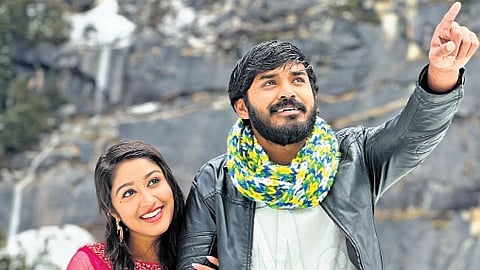

Yello Jogappa Ninnaramane follows Adi (Anjan Nagendra), a young man whose travels across India are not merely about reaching a destination but about uncovering answers to deeper questions that have long been gnawing at him. Two important elements of his journey are his backpack and diary, both central to his quest.
Director Hayavadana’s debut film examines self-discovery, family expectations, and the conflict between personal desires and traditional values. Adi is a man who seeks independence and a life defined by his own choices. He is content creating reels and living freely, but his father’s (Sharath Lohitashwa) expectations loom large over him—his father wants him to take over the family hotel business.
This sets up a central conflict that many can relate to: the tension between personal freedom and familial duty. Adi’s journey to find himself is relatable, and his internal struggles form the backbone of the story.
As Adi travels from south to north, he meets a variety of characters, each offering a new perspective. One of the first is Sangya, a fellow traveller from North Karnataka, who is also on a journey of sorts, searching for his estranged father, Mylarappa (Biradar). Their brief friendship suggests that sometimes the people we meet on our path can offer us the support we need, even in the most unexpected places.
Adi’s next stop takes him to Pandavapura, where he helps an old lady in a doll shop and meets Sheetal (Venya Rai), a young girl running the shop, who seeks help to reach Chandigarh, where she plans to elope with her boyfriend. There is, however, a twist to this encounter. Like the others, it brings Adi closer to understanding the balance between duty and desire.
Through these interactions, the film explores the complexity of relationships and the decisions we make when our hearts and minds are at odds. Later, we see Adi’s encounter with Swara (Sanjana Doss), a YouTube blogger, which challenges Adi’s perspective on life and forces him to confront his journey in a new light.
One of the most heartfelt moments in the film occurs when Adi meets a pregnant woman at a hotel in manali, highlighting how life’s ordinary moments can carry deep, transformative lessons. These experiences should be the heart of the film, yet at times, they feel a bit disconnected, as though the narrative is moving without enough urgency to draw us in completely. While the film captures a sense of emotional depth, it struggles to maintain a steady pace, with some sections feeling slower than others.
The performances in the film are notable, with Anjan Nagendra (Adi) portraying a young man torn between his own aspirations and the weight of his family’s expectations. It’s his second film, but he can work on certain aspects as an actor. Venya Rai and Sanjana Doss support the story with their respective characters, though their roles feel somewhat underdeveloped. Sharath Lohitashwa, as Adi’s father, delivers a grounded performance, capturing the wisdom and expectations of the older generation. His role anchors the thematic exploration of family and responsibility, although his presence is occasionally overshadowed.
While the film’s exploration of family dynamics is well intended, some aspects of the plot leave room for improvement. The interactions between Adi and various characters should feel like milestones in his emotional journey, but at times, these encounters feel like mere plot devices rather than moments of true growth. The slow pacing, while possibly intended to reflect the gradual nature of self-discovery, risks losing the audience’s engagement.
One particular aspect that feels slightly unrealistic is the prevalence of Kannada-speaking characters across the country. As Adi goes northward, he crosses paths with a wide range of people—many of whom, despite being in regions far from Karnataka, speak Kannada fluently. This includes a pair of thieves in Manali who, rather improbably, also communicate comfortably in the language. While it’s not entirely far-fetched that some Kannada speakers might be spread across India, the frequency and consistency of this linguistic connection throughout Adi’s travels feels a bit contrived.
The film’s visuals, however, are a standout. The breathtaking locations, from the southern landscapes to the mountain vistas of Manali, offer a visual contrast to Adi’s internal struggles, beautifully capturing the emotional and physical journey he undertakes.
While Hayavadana makes a thoughtful film that tackles complex themes of self-discovery, family expectations, and the push and pull of personal desires, the slow pacing and occasional narrative gaps prevent it from fully realising its potential. The film’s closing revelation provides an emotional payoff, but it feels earned only after considerable patience.
With its moments of insight and reflection, Yello Jogappa Ninnaramane deserves recognition, but it’s not without its flaws. The film takes its time in unfolding its promise, leaving the audience with a sense of both fulfilment and longing for a more dynamic journey. While it has a lot of heart and potential, the film leaves with mixed feelings by the time the journey ends.
Yello Jogappa Ninnaramane
Director: Hayavadana
Cast: Anjan Nagendra, Venya Rai, Sanjana Doss, and Sharath Lohitashwa
Rating : 2.5/5